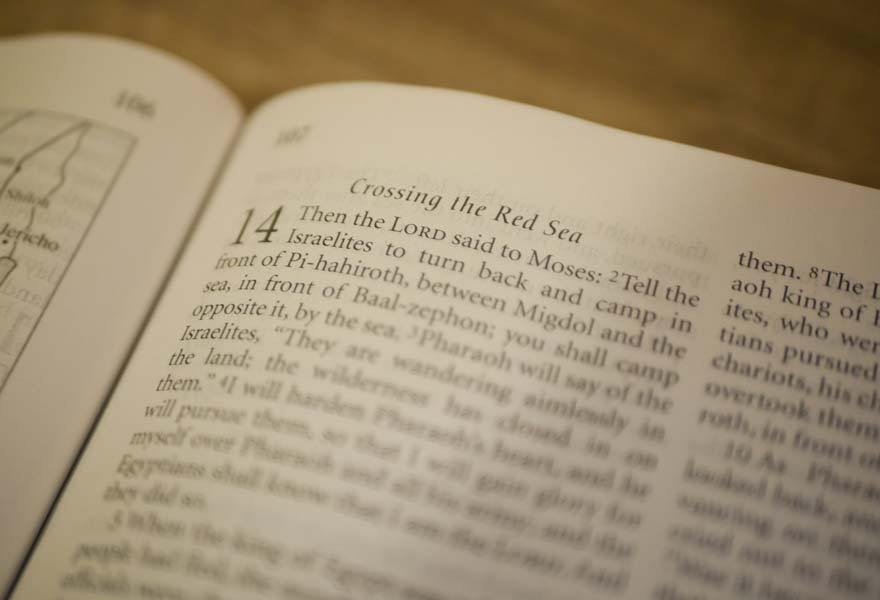The crossing of the red sea is one of the most memorable stories of The Bible. In addition to it’s marvelous display of God’s power, there are some life lessons we can learn if we take a closer look. If you are unfamiliar with the story, after leaving Egypt, the Israelites found themselves between Pharaoh’s army and the red sea. It was their end they thought, but God through Moses parted the sea letting them through. When the Egyptians followed them through, God restored the sea, destroying Pharaoh and his army.
So what are the life lessons we can learn from the crossing of the red sea? The lessons are you may already have the power, remember where you came from, and guard your heart. Let’s look at each of these in more detail.
You May Already Have The Power
The first life lesson from the crossing of the red sea is that you may already have the power. We can take this lesson from what God told Moses when he cried out for his help. The Bible says:
‘Then the Lord said to Moses, “Why are you crying out to me? Tell the Israelites to move on. Raise your staff and stretch out your hand over the sea to divide the water so that the Israelites can go through the sea on dry ground.
Exodus 14:15-16 (NIV)
Before Moses cried out to God for help, God already gave him the staff as a means to do miracles. It was through Moses and his staff that God sent the plagues against Egypt. At the red sea, God expected Moses to know what to do from experience. It’s why God specifically asked, “Why are you crying out to me?”
In the same way that Moses already had the power at the crossing of the red sea, so do we for some of the things we may find ourselves crying out to God for. Throughout his Word, God has made known many laws and principles we are to live by in order to experience certain benefits in life.
For instance, have you ever prayed for wealth? It doesn’t have to be money directly but includes wealth such as a home or similar assets. In such cases, God would reply just as he replied to Moses at the red sea. In reminding the Israelites not to become proud and forget him, God said “remember the Lord your God, for it is he who gives you the ability to produce wealth” (Deuteronomy 8:18 NIV). We are able to produce wealth ourselves. God already gave us the power to.
In other instances, The Bible promises certain benefits if we do certain things such as being blessed by tithing. So if you ever find yourself like Moses at the red sea crying out to God for something, ask yourself: do I already have the power to do it?
Remember Where You Came From
Another lesson from the crossing of the red sea is to remember where you came from. When the Israelites found themselves between the red sea and Pharaoh’s army they began to panic. More specifically, The Bible says “They were terrified and cried out to the Lord” (Exodus 14:10 NIV).
Had they remembered where they came from, they would not have panicked. Before they got to the red sea, God had done many miracles for them. They witnessed God send plagues on the Egyptians while spearing them even though they were nearby.
Unlike the people, Moses remembered where he came from. As a result, it led him to tell the Israelites “Do not be afraid. Stand firm and you will see the deliverance the Lord will bring you today. The Egyptians you see today you will never see again. The Lord will fight for you; you need only to be still” (Exodus 14:13-14 NIV).
As you know, God did come through. “The Israelites went through the sea on dry ground, with a wall of water on their right and on their left” (Exodus 14:22 NIV). Later on, the Israelites would continue to forget where they came from and lose faith repeatedly.
Just like the Israelites lost faith at the red sea, we can find ourselves losing faith when experiencing difficulties in life. But if we remember where we came from when such circumstances arise, we’ll have more confidence. Think back to the last challenge you faced that worked out. If you can remember, think back to a challenge before that. Each time you thought it wouldn’t work out, it did. What’s the likelihood of future situations being any different?
So unlike the Israelites who lost faith at the red sea and beyond, remember where you came from. The same God that came through when there appeared to be no way, is the same God that can do it again.
Guard Your Heart
The last life lesson we’ll look at from the crossing of the red sea is to guard your heart. It’s inspired by the character you’d least expect; Pharaoh. Because Pharaoh failed to guard his heart, it ultimately led to the death of him and his army.
Up until the crossing of the red sea, The Bible often states that the Lord will harden Pharaoh’s heart and he will do a certain thing. The Lord hardening Pharaoh’s heart used to confuse me, but later I understood that Pharaoh simply had a stubborn heart and God knew it. In fact, when God called Moses to go to Egypt, he told him “I know that the king of Egypt will not let you go unless a mighty hand compels him” (Exodus 3:19 NIV).
We see Pharaoh’s stubbornness play out throughout the plagues Egypt experienced all the way to his death at the crossing of the red sea. Repeatedly he was told to let the Israelites go, but would not. Even after the death of the firstborn of the Egyptians that appeared to change his heart, The Bible says “Pharaoh and his officials changed their minds about them and said, “What have we done? We have let the Israelites go and have lost their services!” (Exodus 14:5 NIV). His stubborn heart revealed itself once more leading him to die.
In the same way that Pharaoh had a stubborn heart that led to his demise, we can find ourselves with a heart that could lead us to trouble. This is why it’s important to guard your heart. Like everyone else, Pharaoh would have been born with a clean heart, but various influences slowly transformed it into what it became.
For example, tolerating lustful thoughts may lead to fornication or adultery which could be deadly. Viewing too many violent videos may desensitize you leading you to condone violence. The Bible says:
“When tempted, no one should say, “God is tempting me.” For God cannot be tempted by evil, nor does he tempt anyone; but each person is tempted when they are dragged away by their own evil desire and enticed”.
James 1:13-14 (NIV)
In another place it says “Above all else, guard your heart, for everything you do flows from it” (Proverbs 4:23 NIV).
So learning from Pharaoh’s stubborn heart and the ultimate end he came to at the crossing of the red sea, guard your heart. Influences that seem insignificant can take you to a place that’s difficult to come from or possibly death.
Conclusion
The crossing of the red sea is an unforgettable story. In addition to seeing God’s power at work, there are some valuable life lessons to learn from it. In this article we looked at 3; you may already have the power, remember where you came from, and guard your heart.
Just like Moses already had the power but cried out to God for help, you may already have the power. When you are in a difficult situation like the Israelites were, remember that you overcame difficulty before, and guard your heart for everything you do flows from it.
Related articles:


A great commentary, to God be the glory,May the Almighty God continue blessing the work of your hands
Thank you Simon!
Good insight brother. May get to apply these to our adult small group discussion
Thanks. Hope your group discussion goes well!
This was soo helpful for me. Thank you God bless
So happy to hear that. You’re welcome.